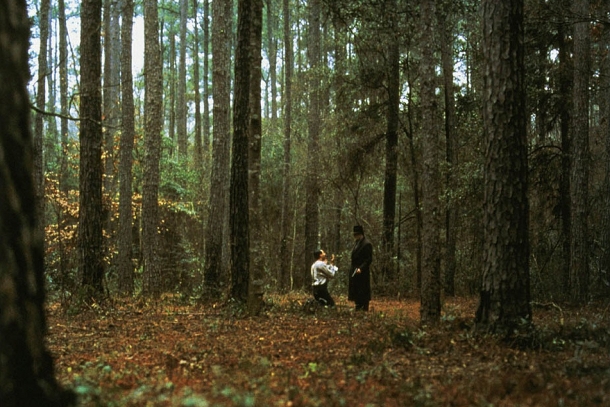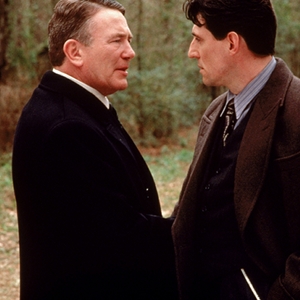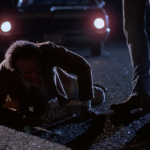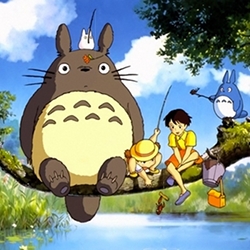
TIFF’s Joel & Ethan Coen - Tall Tales Review: Miller’s Crossing (1990) - NP Approved

Cast: Gabriel Byrne, Albert Finney, John Turturro
Director: Joel Coen, Ethan Coen
Country: USA
Genre: Crime | Drama | Thriller
Editor’s Notes: The following review is part of our coverage for TIFF’s Joel & Ethan Coen: Tall Tales which runs from November 28th to December 20th at TIFF Bell Lightbox. For more information on upcoming TIFF film series visit http://tiff.net and follow TIFF on Twitter at @TIFF_NET.
A fedora blows into a wooded crossroads, surrounded by a bed of delicate flora and grass that sways in the wind like wisps of baby’s hair in the afternoon sun. A sudden gust of wind carries the fedora into the air and down the road, beckoning us to watch the story of Miller’s Crossing, a oft-brutal gangsters’ tale with film-noir roots that paradoxically unfolds with the casual familiar comfort of a warm afternoon breeze as it chooses to retell the old stories in the distinct voice of the Coens instead of forging new cinematic ideas. We see the glint of green depression glass filled with bootleg liquor poured into crystal glasses of two-faced liars and brutal gangsters as they lament that the fix has been “fixed”, as there is neither honor nor a sense of irony among thieves who have been robbed of their perfectly stolen money. The loud-mouthed, crass Johnny Caspar (Jon Polito) demands satisfaction but is only offered a cold thousand-yard stare by Leo (Albert Finney) and the beguiling deceit behind the eyes of his enforcer, Tom Reagan (Gabriel Byrne), a man of many secrets with enough cunning and gumption to seem trustworthy. Leo and Tom speak with the familiarity and affection of father and son, but the hearts of gangsters are as black as midnight and Tom has many unpaid debts and unanswered sins.
…a oft-brutal gangsters’ tale with film-noir roots that paradoxically unfolds with the casual familiar comfort of a warm afternoon breeze as it chooses to retell the old stories in the distinct voice of the Coens instead of forging new cinematic ideas.

Tom has the unfortunate tendency to lose both his hat and the upper-hand in his dangerous interludes with the vivacious Verna (Marcia Gay Harden), as she keeps his hat on the mantle like an unclaimed trophy, knowing that Tom will return despite the danger that comes with canoodling with the boss’s dame. The score punctuates their love affair as it builds with the naïve optimism and moral ambiguity that forged America and Tom treads in dangerous territory with a coy self-assuredness that only comes with having nothing to lose. The morning newspaper has a story about the death of a politician’s “aide” and Tom has fallen into a predicament that is merely one among countless, but he presses on with the collected cool of a villain in a Howard Hawks gangster film, momentary moments of panic in his eyes offering the only clue into his powerlessness over his gambling debts, suspicious boss, and a weaselly opportunistic brother unhindered by dignity (John Turrtoro, delivering a phenomenal performance as the sniveling, two-faced Bernie Bernbaum).
It is comforting and well-executed, a gangster-noir delivered by the children of cinema as the Coens pay homage to the films that excited them and drove them to the path of film-making as they whisper another among countless stories into the warm afternoon breeze of cinematic history.
Johnny Caspar makes a few power plays and the underworld quickly shifts balance, a balance that would be hard earned as Albert Finney’s Leo is a formidable opponent, but it would be maintained by a corrupt mayor and police force that plays for whichever side is winning as they bomb speakeasies and engage in spectacular underhanded firefights with anyone dumb enough to come outside. Tom changes alliances with the same motivations of self-preservation as Toshiro Mifune’s Yojimbo, and finds himself a new shoulder to loom over and whisper self-serving secrets to as Caspar listens to Tom’s lies about the Dane, the only man who can see through Tom’s deception. Tom sees through the hypocrisy and stupidity of the liars and thieves that surround him but is constantly haunted by the fact that death is merely an inevitable punishment for the unprepared. He makes the critical mistake of exhibiting compassion when he allows Bernie to go free instead of murdering him as directed by Caspar’s men, and this mistake would come to haunt him as Bernie has as little honor as he does the ability to work a scenario out to its conclusion.
Miller’s Crossing lives in worlds of quaint and old-fashioned corruption as its time-honored tale of treachery unfolds, but it is through the Coens’ filmic artistry and phenomenal writing that the old stories are given new life. They aren’t straining toward the limits of artistic creativity but they deliver a film that brings color and wisps of blue smoke to the tommy-gun firefights of yesterday’s gangster films with a sense of endearing nostalgia and affection for its roots. It is comforting and well-executed, a gangster-noir delivered by the children of cinema as the Coens pay homage to the films that excited them and drove them to the path of film-making as they whisper another among countless stories into the warm afternoon breeze of cinematic history.
Related Posts
![]()
Matthew Blevins
![]()
Latest posts by Matthew Blevins (see all)

























